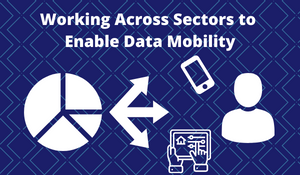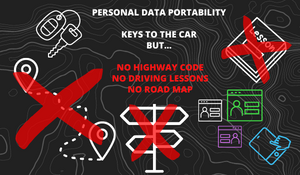Release of Data Mobility Infrastructure Sandbox
We’re today publishing the 1st Ctrl-Shift Personal Data Mobility Sandbox report, a significant first step to enable us all to access the substantial economic and social benefits that Personal Data Mobility offers. Building on the individual’s right to data portability, as defined in GDPR, Personal Data Mobility is the market capability needed to make data sharing safe, easy and valuable.
We’ve published the report with a compendium of detailed findings, openly published, designed to support anyone seeking to create new value from Personal Data Mobility.
Here are the main take away from the report:
-
The end-to-end process of personal data sharing can be made safe
-
Personal Data Mobility can enable valuable new services, and the capabilities already in the market mean that progress can be made in developing these.
-
However, gaps still exist which require coordinated intervention to fully unlock the value of safe Personal Data Mobility and a clear way forward has been mapped to resolve these gaps.
The first in a series of Personal Data Mobility Sandboxes, we’ve been collaborating over the last 5 months with market-leading organisations that represent a range of sectors – Barclays, the BBC, BT, Centrica, Facebook and Digi.me, a leading data facilitator. The Personal Data Mobility Infrastructure Sandbox focuses very specifically on the infrastructure needed to safely share data. Addressing this requires collaboration and in addition to these business participants, we have also worked with a number of independent observers – the Centre for Data Ethics and Innovation, Consumers International, the DCMS, the ICO and the Web Science Institute at the University of Southampton. Their input has been hugely valuable.
The question we asked ourselves was ‘can you as an individual safely share your data from your existing data sources, such as BT or BBC, with your data facilitator at your behest, and working on your behalf, can the data facilitator make that data available to other organisations who can use it to deliver value for you.’ The answer is a resounding YES.
Before we get to the meat of what we discovered, let’s ask ourselves why this is so important today. In a post-Cambridge Analytica world creating a digital trust has become a bit like hunting the snark, just when you thought you’d found happiness, it evaporates before your eyes with new revelations of data loss, data misuse and growing concerns over the influence that data can have over the individuals' decisions and lives. And yet for many countries growth in their digital economies is central to economic well-being, and central to that is the use of personal data. There are many experiments being progressed today to create new fairer more transparent ways of sharing data – the Data Transfer Project, Open Data Initiative and Data Trusts. Personal Data Mobility is significantly different as it puts the individual firmly in control, able to share data with organisations that provide apps and services that enable them as individuals to make better and better-informed decisions and more easily manage the complexity of their lives.
Over the years Personal Data Mobility it has been a much-discussed option for data sharing in a world where data has in the past been regularly shared without sight or explicit permission from the individual and often with minimal if any value flowing to the individual. Our market analysis for the DCMS (UK Governments Department for Digital Culture Media and Sport) and report published in late 2018 Data Mobility: The Data Portability Growth Opportunity For The UK Economy concluded that Personal Data Mobility can be a major accelerator of innovation and economic growth – creating new forms of value for individuals, businesses and society as a whole. It identified a prize of £27.8bn for productivity and efficiency for the UK economy and a far greater opportunity for recombinant innovation and growth. Being able to make Personal Data Mobility work safely will, we believe, be transformational, creating opportunities to develop new trusted information-sharing relationships between individuals and organisations, while providing new opportunities for value. Offering senior leaders, the capabilities to actively pursue agendas for both privacy and growth.
It’s obviously a prize that our partner organisations believe is worth pursuing. The Personal Data Mobility Infrastructure Sandbox is an exceptional collaboration with a set of organisations with extraordinarily deep knowledge and experience, enabling us all to make groundbreaking progress towards realising our shared vision of Personal Data Mobility.
So what have we been doing? The report published today covers this first phase of work and describes the current in-market enabling capabilities for data sharing and importantly defines the gaps that need to be filled for it to be safe and valuable. To signpost the way forward, it also identifies the gaps that the Data Mobility Infrastructure Sandbox has prioritised for attention in its next phase of work.
Findings and Outcomes
-
Our primary conclusion is that the end-to-end process of personal data sharing can be made safe. Much of the infrastructure and capabilities required for safe data sharing already exist. Significant in this are the services provided by Data Facilitators, in helping individuals share and gain value from their data whilst controlling it securely.
-
Personal Data Mobility can enable valuable new services, and the capabilities already in the market mean that progress can be made in developing these. This sandbox included a first exploration of how increased Personal Data Mobility can create value. Working with data innovators, the Sandbox demonstrated how combining multiple data types, made accessible by Personal Data Mobility, can lead to the creation of more valuable services, with increased personalisation, better prediction and more timely interventions.
-
Critical gaps exist, which require coordinated intervention to fully unlock the value of safe Personal Data Mobility. These fall into the two categories of Governance structures and Integrated end-to-end customer journeys.
-
A clear way forward has been defined to address these gaps, based on two streams of activity:
-
Governance issues of Liability and 3rd Party Validation. Building rigorous frameworks for the development of practical governance solutions, which also embody relevant and effective capabilities currently in the market, to achieve rapid progress.
-
Enabling the integrated end-to-end customer journey for Personal Data Mobility. Making the user experience easy and safe is critical for there to be widespread uptake of Personal Data Mobility services. This workstream will focus on the design and technical challenges of enabling people to share their data with minimal effort and risk.
-
-
The Ctrl-Shift Data Mobility Sandbox Programme also includes a series of Data Mobility Value Sandboxes. Realising value from sharing their personal data will be what drives individuals to use Personal Data Mobility services. The Value Sandboxes will concentrate on the Customer Value Opportunities, which can offer the greatest benefit to individuals and therefore, businesses, society and overall economic growth.


